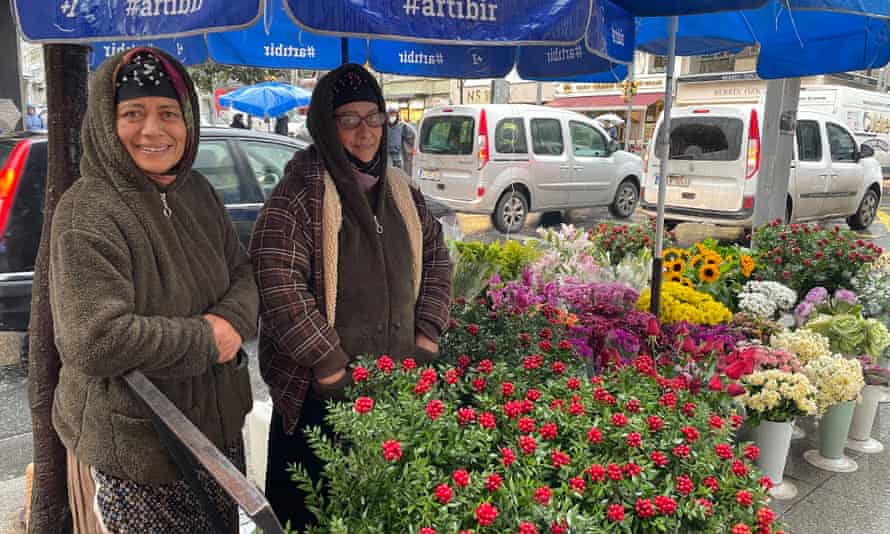Gypsies depend on holiday cash while Turkey’s economy fails Turkey
[ad_1]
When flower sellers take out red and green coca on the street, the holiday season has arrived in Istanbul.
It is believed to have started as a Christmas tradition of the Greek community in Turkey, coca it is made by joining two different plants that grow in the wild and looks like a perfect version of holly. Its name comes from the Greek for red.
Gypsy florists have been making this bouquet for at least a century, picking blood-red berries and stems, both of thorny plants found in the woods. It is a vital source of income for many gypsies – members of one of the poorest ethnic groups in Turkey, who are banned from all low-paying jobs due to widespread discrimination – and especially this year, when there are little work available and the economic situation. it gets worse.
The Turkish lira plunged to an all-time low against the dollar on Monday, after losing half its value since early 2021. The cost of goods has skyrocketed due to government insistence on interest rates. ‘low interest rates although inflation wiped out profits, especially for the poorest households. Social media is full of images of long queues for subsidized bread, sold by opposition municipalities Istanbul go to the capital, Ankara.
Eyüp, a 23-year-old gypsy cleaning worker in Istanbul, used his annual vacation to search for the red berries in Samsun, a city by the Black Sea. He had to leave his wife and two young children at home, and for weeks he has been staying in a makeshift tent in the cold, climbing tall trees and bushes to reach the groups they call. squeaky.
Kokina he does not wither for months after being searched, which could explain the popularity of this laborious invention that Eyüp called “torture to do.” “My hands are horrible because of the thorns,” he said. “But I had to pay my bills.” The family does not have a refrigerator at home, and lately the formula of milk and diapers cannot be allowed for their children.
According to official statistics, annual inflation reached 21.31% in November, a figure that critics say is too low and does not reflect reality. An independent group of academics called the Inflation Research Group has been challenging official figures with calculations of 58.65% in November.
The main opposition leader, Kemal Kılıçdaroğlu, wrote to supermarket owners in December urging them not to raise prices for “10 items for survival” during the winter, including flour, salt and pasta. This seems unlikely: since January, egg prices have risen by 48% and yoghurts by 45%, according to a survey by teyit.org, a data verification platform that compared price tags on two popular retailers.

“We are all impoverished, but for some, there is no lower step,” said Hacer Foggo, a veteran civil society activist who founded an NGO called the Deep Poverty Network during the pandemic to support those most in need. , many of whom are gypsies.
Some gypsy families you know can’t afford baby food, replacing it with sugary water. In almost every home that NGO workers visit now, they see delays in the development of young children due to chronic malnutrition. “A six-year-old looks like three,” Foggo said.
In a 2020 survey, the group found that 49% of households could not even afford drinking water. “It has gotten a lot worse since then,” he added.
A 2012 Council of Europe report stated that Turkey had the largest Roma population in Europe and that there had been regular attempts to improve it. Turkish President Recep Tayyip Erdogan in 2010 apologized to gypsies for decades of discriminatory policies and announced an initiative to help. Another action plan followed in 2016, but critics have said both remain on paper.
Poverty is passed down from generation to generation, Foggo said. “The gypsy kids I met years ago are picking up trash like their parents.”
Kokina, it has also been passed down from generation to generation. An article in the 1934 Turkish newspaper mentioned “Selling gypsies to cooka for Christmas ”on Istiklal Caddesi, a popular shopping avenue in the heart of Istanbul. “We learned to do it from our grandparents as children,” Eyüp said. It has gathered at least 10,000 branches since October.
“All hopes are on coca now, “Foggo said.

